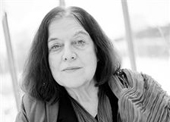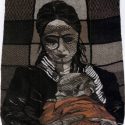Heidi von Born comes from Stockholm, but lived in Finland for seven years after her mother’s death in 1945 and grew up with relatives. She graduated from university in 1960, worked from 1960 to 1968 as a secondary school teacher of Swedish and with the mentally ill at the hospital Rålambshovs Sjukhus in the 1970s. She was also editor of the magazine Åttiotal, later Nittiotal, and from 1983 to 1986 was vice-chairman of Sveriges Författarförbund (Swedish Writers’ Union).
Heidi von Born, who has brought Australian, Canadian, and Japanese literature to Swedish readers, was a member of the Committee for the Nordic Council Literature Prize for a number of years in the 1990s. Her debut work, Det förtrollade huset (P), was published in 1956. Mental illness is the subject of her novel Dagar som de faller, 1972, about the psychotic character Jenny, but she had already begun to write about outcasts in her novel Handen full of 1969 about a deaf boy called Seb. She deals with the same subject in her novels Insida, 1966, Den tredje handen, 1974, Simulantens liv, 1977, and Det japanska skriket, 1979. Her five novels about the character Ella, which begin with Hungerbarnen, 1981, and end with Ropa stenarna tillbaka, 1991, describe a young woman’s development from childhood through to adult life. Her novel Månens vita blod of 1988 is set in a Canadian university community. In 1993 and 1995 she published the novels Om solen vill and En sida av himlen.
Additions by the editorial team 2011:
The above biography was first published in 1998. Since then, Heidi von Born has written the novels Änglarnas stad, 1998, En högtidlig yra, 2003, Eldprovet, 2005, and Ett bländande ljus, 2008.
She has received several honours, including the Lars Ahlin Grant 1996, the De Nio Winter Prize, 2004, and Stockholm læser, 2004.



